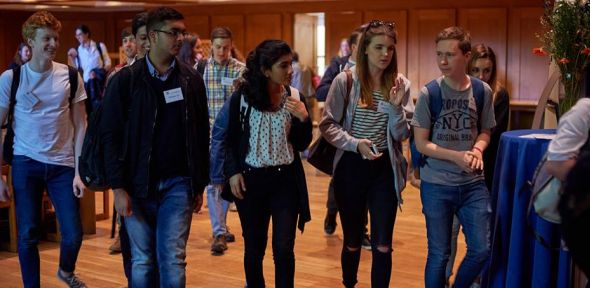
On 2 July 2016 the Department of Slavonic Studies welcomed an enthusiastic group of secondary school students in Years 11 and 12 to Cambridge for a day of language taster sessions and rich presentations in literature, film and culture.
Designed for students who are already studying Russian as well as for students just itching to get started, the event sought to introduce prospective applicants to the Cambridge degree and to promote the study of the Russian language and Slavonic Studies more generally. Participants mixed with academic staff as well as current undergraduates -- and even recited Russian futurist poetry together.
'Our Department is committed to building interest in and excitement for the study of Russia, Poland and Ukraine', said Dr Rory Finnin, Head of the Department of Slavonic Studies. 'Applying to study Russian at Cambridge – and potentially adding Polish and/or Ukrainian from the second year of study – is to embark on an intellectual adventure that will distinguish students for the rest of their lives. It is also to join the ranks of a highly employable community of scholars who forge rewarding careers in such diverse fields as journalism, law, politics, and diplomacy.'
The programme of the outreach event began with taster language lessons for three different groups of students: pure beginners, students with GCSE Russian, and students with A-Level Russian. These sessions were led by Mrs Natasha Franklin, Dr Elena Filimonova and Dr Susan Larsen. After a lunch with staff and current Cambridge undergraduates, participants then enjoyed a presentation on the 'super-charged' cultural legacy of St Petersburg by Dr Alyson Tapp entitled "'Streets Are Our Brushes, Squares Are Our Palettes’: City, Art and Language in Revolution". The event closed with a session on 'Art, Politics and Protest: 1953 to the Present' by Dr Susan Larsen, which explored three moments in Russian and Soviet history when artistic innovation and political change intertwined with particularly dramatic results: the brief ‘Thaw’ that began after Stalin’s death in 1953; the era of openness (glasnost’) and restructuring (perestroika) that preceded the dissolution of the Soviet Union in 1991; and the extraordinary wave of public protests that filled many Russian city streets in 2011 and 2012.
Please email slavon@hermes.cam.ac.uk to join our mailing list and express your interest in our future outreach activities and initiatives. Photos of the 2016 event can be found on the Facebook page of the Cambridge Committee for Russian and East European Studies (CamCREES).





